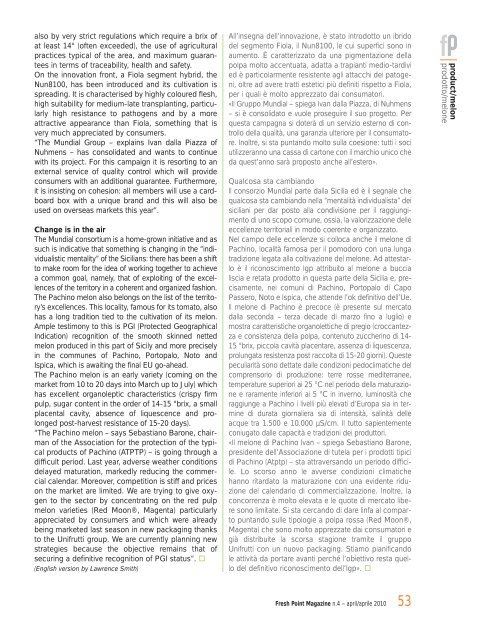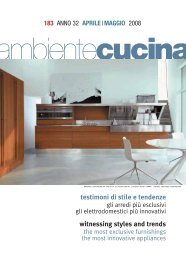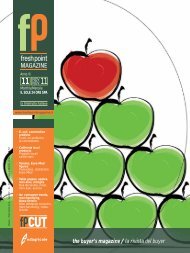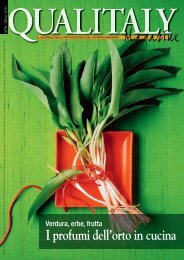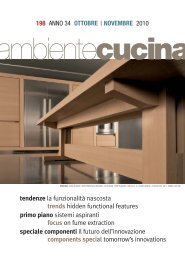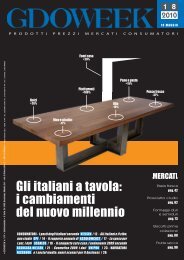Fresh Point Magazine - B2B24 - Il Sole 24 Ore
Fresh Point Magazine - B2B24 - Il Sole 24 Ore
Fresh Point Magazine - B2B24 - Il Sole 24 Ore
Create successful ePaper yourself
Turn your PDF publications into a flip-book with our unique Google optimized e-Paper software.
also by very strict regulations which require a brix of<br />
at least 14° (often exceeded), the use of agricultural<br />
practices typical of the area, and maximum guarantees<br />
in terms of traceability, health and safety.<br />
On the innovation front, a Fiola segment hybrid, the<br />
Nun8100, has been introduced and its cultivation is<br />
spreading. It is characterised by highly coloured flesh,<br />
high suitability for medium-late transplanting, particularly<br />
high resistance to pathogens and by a more<br />
attractive appearance than Fiola, something that is<br />
very much appreciated by consumers.<br />
“The Mundial Group – explains Ivan dalla Piazza of<br />
Nuhmens – has consolidated and wants to continue<br />
with its project. For this campaign it is resorting to an<br />
external service of quality control which will provide<br />
consumers with an additional guarantee. Furthermore,<br />
it is insisting on cohesion: all members will use a cardboard<br />
box with a unique brand and this will also be<br />
used on overseas markets this year”.<br />
Change is in the air<br />
The Mundial consortium is a home-grown initiative and as<br />
such is indicative that something is changing in the “individualistic<br />
mentality” of the Sicilians: there has been a shift<br />
to make room for the idea of working together to achieve<br />
a common goal, namely, that of exploiting of the excellences<br />
of the territory in a coherent and organized fashion.<br />
The Pachino melon also belongs on the list of the territory’s<br />
excellences. This locality, famous for its tomato, also<br />
has a long tradition tied to the cultivation of its melon.<br />
Ample testimony to this is PGI (Protected Geographical<br />
Indication) recognition of the smooth skinned netted<br />
melon produced in this part of Sicily and more precisely<br />
in the communes of Pachino, Portopalo, Noto and<br />
Ispica, which is awaiting the final EU go-ahead.<br />
The Pachino melon is an early variety (coming on the<br />
market from 10 to 20 days into March up to July) which<br />
has excellent organoleptic characteristics (crispy firm<br />
pulp, sugar content in the order of 14-15 °brix, a small<br />
placental cavity, absence of liquescence and prolonged<br />
post-harvest resistance of 15-20 days).<br />
“The Pachino melon – says Sebastiano Barone, chairman<br />
of the Association for the protection of the typical<br />
products of Pachino (ATPTP) – is going through a<br />
difficult period. Last year, adverse weather conditions<br />
delayed maturation, markedly reducing the commercial<br />
calendar. Moreover, competition is stiff and prices<br />
on the market are limited. We are trying to give oxygen<br />
to the sector by concentrating on the red pulp<br />
melon varieties (Red Moon®, Magenta) particularly<br />
appreciated by consumers and which were already<br />
being marketed last season in new packaging thanks<br />
to the Unifrutti group. We are currently planning new<br />
strategies because the objective remains that of<br />
securing a definitive recognition of PGI status”.<br />
(English version by Lawrence Smith)<br />
All’insegna dell’innovazione, è stato introdotto un ibrido<br />
del segmento Fiola, il Nun8100, le cui superfici sono in<br />
aumento. È caratterizzato da una pigmentazione della<br />
polpa molto accentuata, adatta a trapianti medio-tardivi<br />
ed è particolarmente resistente agli attacchi dei patogeni,<br />
oltre ad avere tratti estetici più definiti rispetto a Fiola,<br />
per i quali è molto apprezzato dai consumatori.<br />
«<strong>Il</strong> Gruppo Mundial – spiega Ivan dalla Piazza, di Nuhmens<br />
– si è consolidato e vuole proseguire il suo progetto. Per<br />
questa campagna si doterà di un servizio esterno di controllo<br />
della qualità, una garanzia ulteriore per il consumatore.<br />
Inoltre, si sta puntando molto sulla coesione: tutti i soci<br />
utilizzeranno una cassa di cartone con il marchio unico che<br />
da quest’anno sarà proposto anche all’estero».<br />
Qualcosa sta cambiando<br />
<strong>Il</strong> consorzio Mundial parte dalla Sicilia ed è il segnale che<br />
qualcosa sta cambiando nella “mentalità individualista” dei<br />
siciliani per dar posto alla condivisione per il raggiungimento<br />
di uno scopo comune, ossia, la valorizzazione delle<br />
eccellenze territoriali in modo coerente e organizzato.<br />
Nel campo delle eccellenze si colloca anche il melone di<br />
Pachino, località famosa per il pomodoro con una lunga<br />
tradizione legata alla coltivazione del melone. Ad attestarlo<br />
è il riconoscimento Igp attribuito al melone a buccia<br />
liscia e retata prodotto in questa parte della Sicilia e, precisamente,<br />
nei comuni di Pachino, Portopalo di Capo<br />
Passero, Noto e Ispica, che attende l’ok definitivo dell’Ue.<br />
<strong>Il</strong> melone di Pachino è precoce (è presente sul mercato<br />
dalla seconda – terza decade di marzo fino a luglio) e<br />
mostra caratteristiche organolettiche di pregio (croccantezza<br />
e consistenza della polpa, contenuto zuccherino di 14-<br />
15 °brix, piccola cavità placentare, assenza di liquescenza,<br />
prolungata resistenza post raccolta di 15-20 giorni). Queste<br />
peculiarità sono dettate dalle condizioni pedoclimatiche del<br />
comprensorio di produzione: terre rosse mediterranee,<br />
temperature superiori ai 25 °C nel periodo della maturazione<br />
e raramente inferiori ai 5 °C in inverno, luminosità che<br />
raggiunge a Pachino i livelli più elevati d’Europa sia in termine<br />
di durata giornaliera sia di intensità, salinità delle<br />
acque tra 1.500 e 10.000 µS/cm. <strong>Il</strong> tutto sapientemente<br />
coniugato dalle capacità e tradizioni dei produttori.<br />
«<strong>Il</strong> melone di Pachino Ivan – spiega Sebastiano Barone,<br />
presidente dell’Associazione di tutela per i prodotti tipici<br />
di Pachino (Atptp) – sta attraversando un periodo difficile.<br />
Lo scorso anno le avverse condizioni climatiche<br />
hanno ritardato la maturazione con una evidente riduzione<br />
del calendario di commercializzazione. Inoltre, la<br />
concorrenza è molto elevata e le quote di mercato libere<br />
sono limitate. Si sta cercando di dare linfa al comparto<br />
puntando sulle tipologie a polpa rossa (Red Moon®,<br />
Magenta) che sono molto apprezzate dai consumatori e<br />
già distribuite la scorsa stagione tramite il gruppo<br />
Unifrutti con un nuovo packaging. Stiamo pianificando<br />
le attività da portare avanti perché l’obiettivo resta quello<br />
del definitivo riconoscimento dell’Igp».<br />
<strong>Fresh</strong> <strong>Point</strong> <strong>Magazine</strong> n.4 – april/aprile 2010<br />
53<br />
product/melon<br />
prodotto/melone


